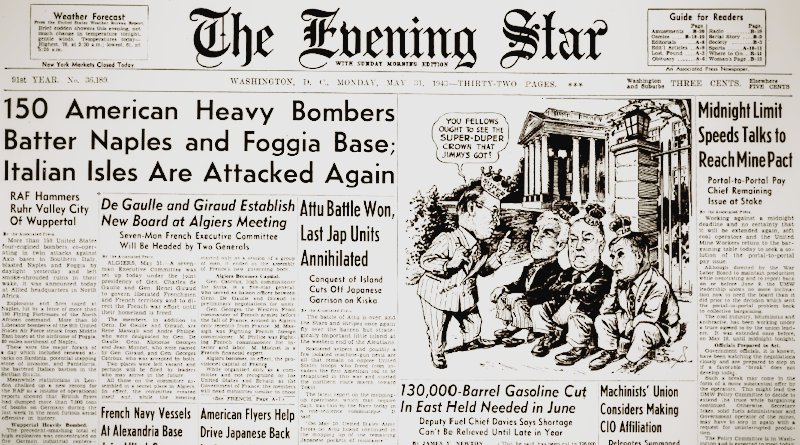World War II Chronicle: May 31, 1943
Click here for TODAY’S NEWSPAPER
Page six notes the passing of Brig. Gen. James A. Drain, former president of the National Rifle Association (NRA) and commander of the American Legion. I have surely missed quite a few obituaries of noteworthy American veterans since the Chronicle began, but I am glad to have caught General Drain’s. Selected as Washington state’s adjutant general, he raised the standards for their National Guard to the point that they were considered the best in the nation. He focused heavily on marksmanship training, which led many guardsmen to become competitive shooters.
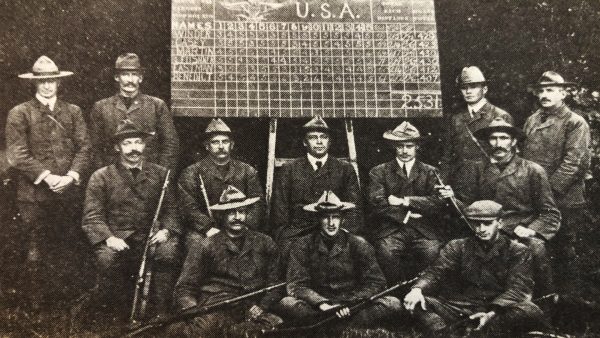
His leadership was recognized by Pres. Theodore Roosevelt, and soon Drain was in a position to drive higher standards for the National Guard across the United States.
Drain was named captain for the 1908 U.S. Olympic rifle team. All members of Drain’s gold-medal team were members of the National Guard: New York’s Lt. Col. William F. Leushner served in the Pancho Villa Expedition and was a marksmanship instructor during World War I. Col. Charles B. Winder Jr., Cpl. Ivan L. Eastman, and Capt. Charles Sumner Benedict all served in the Ohio National Guard. Maj. William Martin served in the 2nd New Jersey Infantry. Maj. Kellogg K.V. Casey was a veteran of the Spanish-American War, fighting in the Battle of San Juan Hill with New York’s 71st Infantry Regiment. Perhaps the top sharpshooter in the nation, Casey served in the New York, Delaware and Pennsylvania branches of the National Guard. He also earned the Silver Medal in the 1,000 using a regular-issue M1903 Springfield while his competitors used specialized rifles with telescopic sights. He later becomes the director of the NRA.
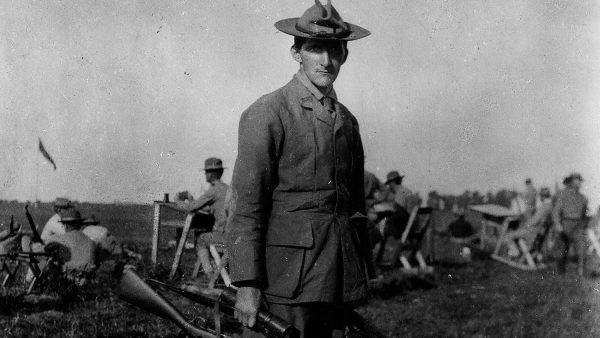
Despite having lost a hand in a hunting accident, Drain was the only soldier to deploy with the American Expeditionary Force who had a serious handicap. The self-taught lawyer and accountant (he never attended college) served on the Anglo-American Tank Commission, earning the Distinguished Service Medal for his efforts. Interestingly, Capt. Dwight D. Eisenhower was the man who would assemble and train the first armored soldiers in the United States. He first had to figure out how to operate the tank himself so he could train his soldiers. This was carried out on the grounds of the Gettysburg Battlefield, just 55 years after the famous Civil War battle. Eisenhower’s outstanding performance with the tank school at Camp Colt is the reason he he was kept stateside once his unit was ready to ship out. He had been temporarily promoted to lieutenant colonel and also received the Distinguished Service Medal.
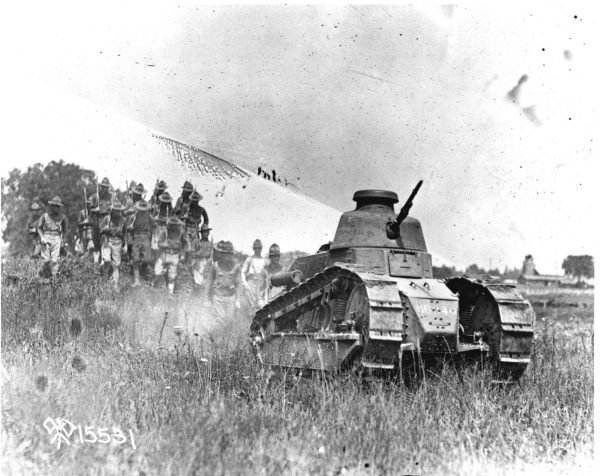
Before Eisenhower could join George Patton and the Tank Corps in France, the war had ended. His next project is a cross-country convoy that would later revolutionize America’s highway system. After that, he coaches football and commands a tank battalion at Fort Meade and then it’s off to Panama where he is assigned to the staff of Fox Conner’s 20th Infantry Brigade. Yes, Eisenhower coached football. After graduating from West Point (Class of 1915) he was assigned to Fort Sam Houston and the Army gave him permission to coach nearby Peacock Military Academy’s football squad. Next season he was approached by the priests at St. Louis College (now St. Mary’s University) to serve as skipper for their football team that hadn’t won a game in five seasons. His squad finished 5-1-1.
The “Kansas Cyclone” was a very promising back until he had a career-ending knee injury his freshman year. His roommate at West Point was Paul A. Hodgson, who was part of Army’s undefeated 1914 squad. Hodgson was recalled to active duty to become executive officer at Fort Sam Houston. Other teammates who are still serving:
- Omar Bradley, commanding general of II Corps and about to pin on lieutenant general stars
- William M. Hoge, Distinguished Service Cross recipient during World War I, directed the construction of the Alaska Highway
- Bob Neyland, one of college football’s greatest coaches, supervises transportation in the China-Burma-India Theater
- Lewis Merrilat, resigned from the French Foreign Legion to become a colonel in the U.S. Army. Prior to training U.S. forces, he had trained tens of thousands of Chinese and Iranian troops.
- Vernon E. Prichard, commanding general of 14th Armored Division
- James Van Fleet, currently leads 8th Infantry Regiment. Will command Eighth Army during the Korean War.
- Alex Weyand, nicknamed “Babe” by Eisenhower, earned a Silver Star and the Purple Heart during the First World War but had too much hearing damage to serve in combat during World War II.
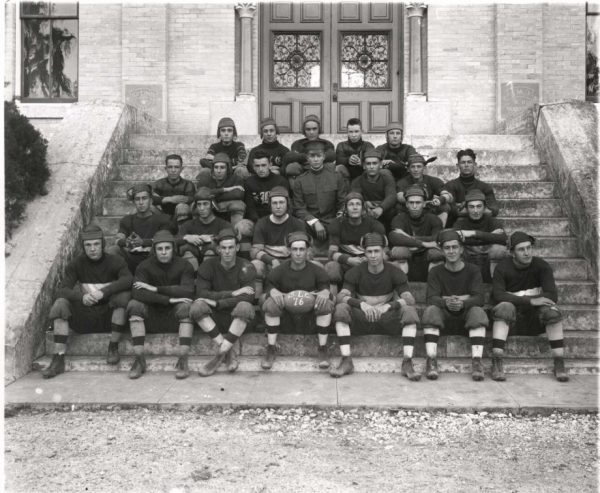
Sports section begins on page 10, and speaking of football, former Texas A&M fullback Joltin’ John Kimbrough is pictured during a flight. The two-time All-American and 1940 Heisman runner-up is training to become a pilot at Pecos Army Air Field… George Fielding Eliot column on page 12… Page 26 reports that Maj. Clarence L. Tinker Jr. has been reported missing. His father Maj. Gen. Clarence Tinker Sr. was lost during the Battle of Midway last year. His son was a P-38 pilot with the 14th Fighter Group and was lost on May 18 mission to Pantelleria. No trace of him is found.
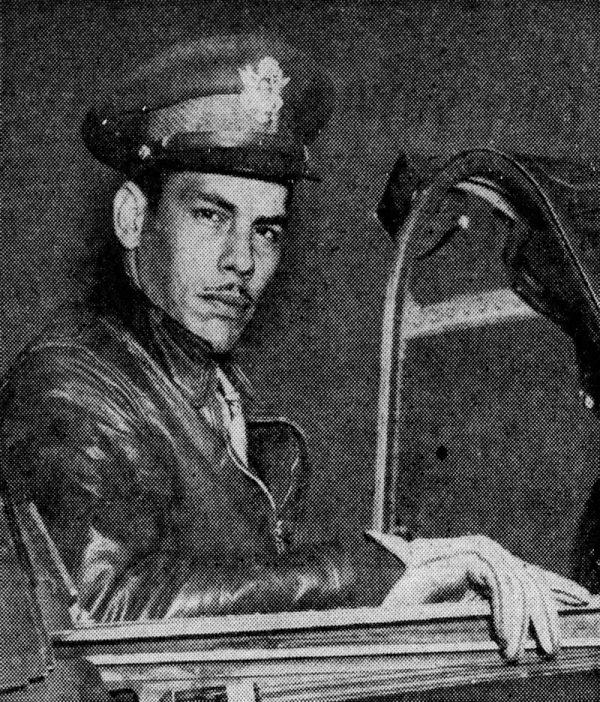
Roving Reporter by Ernie Pyle
ALLIED HEADQUARTERS, North Africa — During the Tunisian campaign I had a chance to visit the Ninth Division only once. I didn’t know a soul in this division, and I drove into their shrub-hidden command post with the same feeling of lonely uneasiness one gets in approaching a strange big city for the first time.
But as we piled out of our jeep one of the M.P.’s came over and pulled one of these columns out of his pocket — one written way back last winter about the Military Police. He laughed and said he’d been waiting a long time for me to show up. He said he knew the Military Police were good but he didn’t think they were quite as good as I made them out.
This particular soldier was Pvt. Walter Wolfson, of New York. He is a coffee merchant by profession, a radio actor by avocation, and a soldier by the trend of events. Wolfson’s family owns a coffee-importing business — the Empire Coffee Mills, at 323 W. 42nd St. He had some newspaper pictures of crowds queuing up at their door to buy coffee after rationing started. His mother and brother run the business while he is away.
Wolfson’s sergeant says of him, “If he can sell coffee like he can stop autos, he must have a good business.”
Before he went into the Army Wolfson was on the “Rainbow House” program. He knows a lot of poetry and opera by heart and is always reciting and singing around camp.
Wolfson’s sergeant is Charles Harrington, a former mill worker from Gary, Ind. He is another one with pistol grips made from the windshield of a Messerschmitt, and he carries a picture of his wife in each side of his gun handle.
Sergeant Harrington is the only soldier I’ve ever seen who digs round foxholes instead of rectangular ones. He says that’s literally so it will be harder for strafing bullets to get at him, but figuratively so the Devil can’t get him cornered. He says he’s convinced the adage is true that “there are no atheists in foxholes.”
Running onto these two was a pretty good start in breaking into new territory. So then we went up to the tent where correspondents always check in and find out what’s going on, and who should be there but Major Robb, an old friend of mine from the San Francisco Exposition. I met him when he was publicizing the big fair. Then on another trip he and I went out together to visit Jack London’s old home, the Valley of the Moon. And on a later visit to San Francisco he went with me through the wine country while I was writing some columns about the vineyards. And the last time I saw him was at the Golden Gate a year and a half ago. He was a lieutenant then, in Army public relations at the Presidio — and rapidly going nuts I might add, from the chaos. To escape that treadmill he asked for overseas duty, and boy did he get it! He was right in the thick of things in the latter phase of the Tunisian campaign. He’s a major now, and having the time of his life.
Private Wolfson, Sergeant Harrington and Major Robb have one thing in common with every soldier in the Army — they think their division is the best one extant.
Being myself a man without a division, I just agree with them all.
Pfc. Joseph Lorenze is one of my infantry friends out of the First Division. His home is at Inglewood, Cal. He’s a nice, quiet, friendly fellow who worked in a furniture factory before the war.
We were together during that unforgettable period when our infantry was fighting day and night for the hills west of Mateur. I wanted to put Lorenze’s name in the paper, but I told him I didn’t like to use names without having some little anecdote to go with them that would be interesting to everybody. So while the shells commuted incessantly back and forth overhead, Private Lorenze and I sat in our foxholes and thought and thought, and damned if we could think of a thing to say about him, even though he had been through four big battles.
So finally I said, “Well, I’ll put it in anyhow. You only life half a mile from my witty friend Cavanaugh, so I’ll hook it up with that some way.”
You may remember my friend Cavanaugh. He was in France in the last war when he was 16 years old. This time he is serving his country by writing me funny letters about the home front, to keep up my morale. In the latest one he says:
“This is just getting around to being a fit country to live in. No gas, no tires, no salesmen, no gadgets, and plenty of whisky to last the duration. Money ain’t worth a damn and I’m glad I’ve lived to see the day. Everybody you talk to has a military secret. I have completed my plans for the post-war world, and I find no place in it for you. Good luck with your frail body, my friend, and try to bring it back to Inglewood sometime. And a can of salmon would be nice too.”
So some day Private Lorenze and I will take off our shoes and lie in the grass in Cavanaugh’s backyard and tell him all about our narrow escapes on Hill 428 and not even listen when he tries to get in a word about how it was around Verdun and Vimy Ridge.
Pfc. Joseph P. Lorenze earned the Bronze Star Medal and the Purple Heart and departed in 2014.
Evening star. (Washington, D.C.), 31 May 1943. Chronicling America: Historic American Newspapers. Lib. of Congress.
https://chroniclingamerica.loc.gov/lccn/sn83045462/1943-05-31/ed-1/
